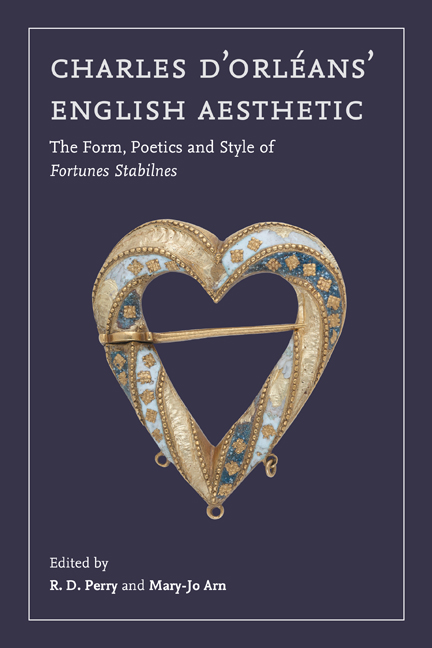Book contents
- Frontmatter
- Dedication
- Contents
- List of Illustrations
- List of Contributors
- Acknowledgements
- Abbreviations
- Introduction
- 1 The Two Dreams of Charles d’Orléans and the Structure of His English Book
- 2 Charles d’Orléans’ Cross-Channel Poetics: The Choice of Ballade Form in Fortunes Stabilnes
- 3 The English Roundel, Charles’s Jubilee, and Mimetic Form
- 4 A Grieving Lover: The Work of Mourning in Charles’s First Ballade Sequence
- 5 Charles d’Orléans’ English Metrical Phonology
- 6 The English Poetry of a Frenchman: Stress and Idiomaticity in Charles d’Orléans
- 7 Verb Use in Charles d’Orléans’ English
- 8 Charles d’Orléans and His Finding of English
- 9 Aureation as Agon: Charles d'Orléans versus John Lydgate
- 10 Charles d’Orléans, Harley 682, and the London Book-Trade
- 11 The Form of the Whole
- Select Publications, 2007–2020
- Index
7 - Verb Use in Charles d’Orléans’ English
Published online by Cambridge University Press: 14 October 2020
- Frontmatter
- Dedication
- Contents
- List of Illustrations
- List of Contributors
- Acknowledgements
- Abbreviations
- Introduction
- 1 The Two Dreams of Charles d’Orléans and the Structure of His English Book
- 2 Charles d’Orléans’ Cross-Channel Poetics: The Choice of Ballade Form in Fortunes Stabilnes
- 3 The English Roundel, Charles’s Jubilee, and Mimetic Form
- 4 A Grieving Lover: The Work of Mourning in Charles’s First Ballade Sequence
- 5 Charles d’Orléans’ English Metrical Phonology
- 6 The English Poetry of a Frenchman: Stress and Idiomaticity in Charles d’Orléans
- 7 Verb Use in Charles d’Orléans’ English
- 8 Charles d’Orléans and His Finding of English
- 9 Aureation as Agon: Charles d'Orléans versus John Lydgate
- 10 Charles d’Orléans, Harley 682, and the London Book-Trade
- 11 The Form of the Whole
- Select Publications, 2007–2020
- Index
Summary
The idiosyncrasies long noted in Charles d’Orléans’ English verse pose questions of linguistic interest, not least whether they should be viewed in terms of incomplete second-language learning, or else as stylistic innovation. This issue is considered here within an interpretive framework of L2 (second language) acquisition, ultimate attainment, and residual error. The claim by Antonella Sorace and others that in high proficiency L2 syntax is mainly vulnerable at interfaces with discourse and semantics is taken as a starting point of an investigation of the poet's use of verbs. It is first shown that Charles's frequent inversion of auxiliary and main verbs in auxiliated clauses does not engage with the semantics of the clause, but is better seen as influenced by medieval French Stylistic Fronting. The chapter then turns to verb complementation. Charles's use of cause as a bare-infinitive taking auxiliary, otherwise unattested in MED, is discussed here, as are numerous other verb argument structure peculiarities with items such as prevail, repair, lust, yield, comfort, ravish, weep, speak, etc.
A further question is whether Charles's French-speaking interlocutors might have used with him a variety influenced by Anglo-Norman, still in use in the early fifteenth century. This possibility is discussed in connection with the poet's lexical imports into English, and his prolific use of verbal prefixation: some unique attestations in Fortunes Stabilnes are prefixed with a- or en-/in-, the two most productive aspectual verbal prefixes in later insular French.
Background to the Study
Studies of L2 acquisition usually acknowledge what is commonly cited as a ‘fundamental difference’ between acquiring a mother tongue and a second language: first-language acquisition normally results in the successful acquisition of the phonological and grammatical structures and the core vocabulary of the child's home variety. In L2 acquisition, however, especially when it takes place after childhood, the usual outcome is somewhat less than full mastery: even in communicatively competent L2 users, typically some traces of a foreign accent and foreign-sounding turns of phrase will be found. This imperfect acquisition outcome in L2 is of course a generalisation over learners in very diverse settings and with very different aptitudes and motivation to learn another language. In modern times, exceptional cases are known, among them Joseph Conrad, who acquired English sufficiently well to be able to write highly regarded novels in that language.
- Type
- Chapter
- Information
- Charles d’Orléans' English AestheticThe Form, Poetics, and Style of Fortunes Stabilnes, pp. 169 - 188Publisher: Boydell & BrewerPrint publication year: 2020



